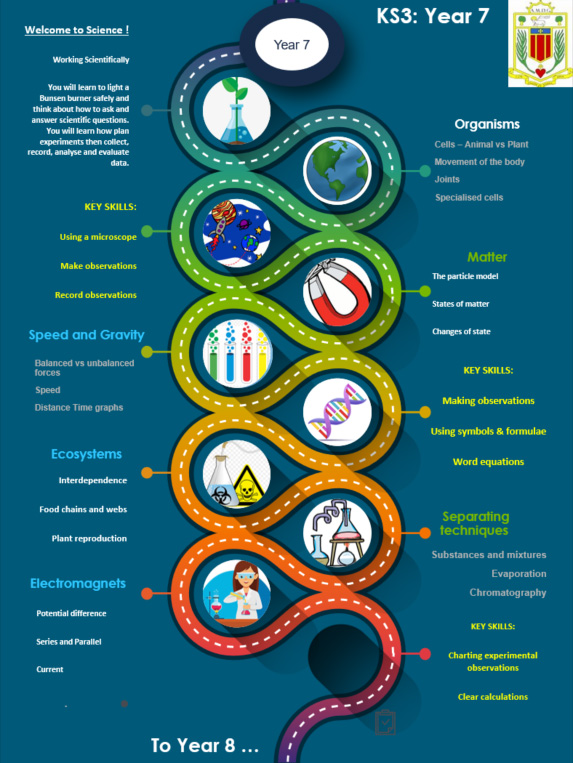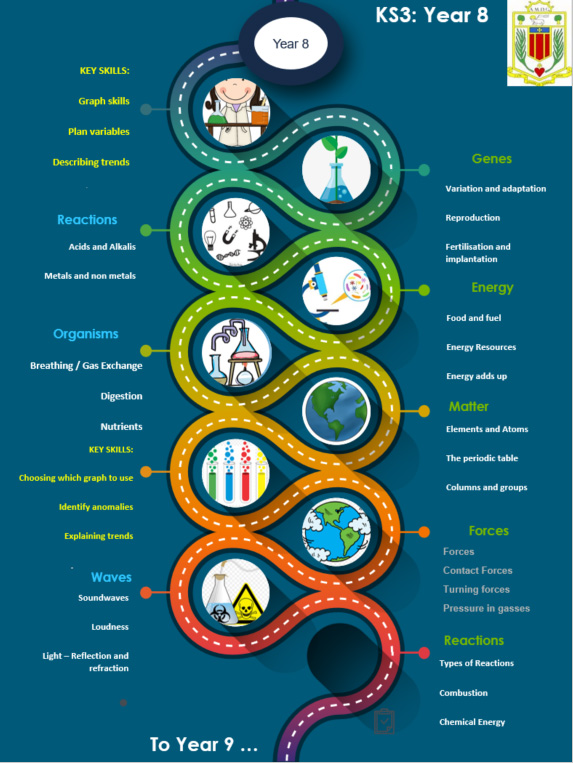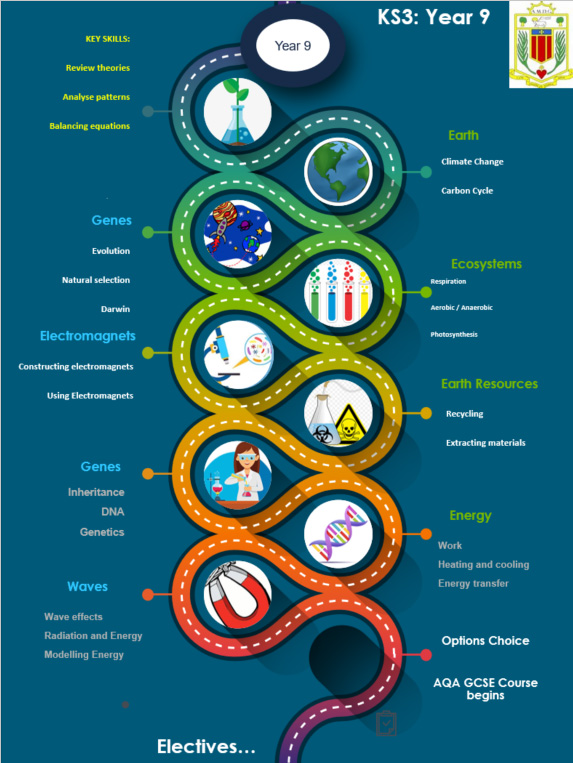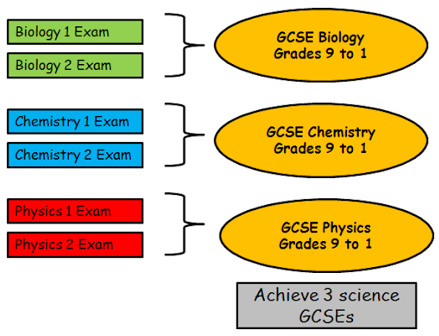Biology
Key Information
Level: A LevelExamination Board: AQA
Subject Leader: Mrs Williams
Entry Requirements
6 in GCSE Biology, 6 in GCSE Combined Science, 6 in GCSE Maths.Why Choose this course?
In recent years many A level Biologists have gone on to study Biology in some way at university, for example, our past students are currently studying medicine, dentistry, veterinary medicine, biochemistry, midwifery, pharmacology, pharmacy, marine biology and nursing. Biology involves the study of a wide range of exciting topics, ranging from molecular biology to ecosystems and from microorganisms to human populations.Biology is never far from the headlines and the A level specification reflects recent developments in the subject such as genetic engineering, stem cell research and epidemiology. It is considered by universities to be a challenging and rigorous academic subject.
Prospects
Possible careers choices include medicine, dentistry, nursing and associated careers, physiotherapy, radiography, veterinary medicine and nursing, pharmaceuticals, research work, teaching, conservation, forestry and many more options.
Course Content
In year 12 the Biology course covers 4 topics:
Biological Molecules
Cells
Organisms exchange substances with their environment
Genetic information, variation and relationships between organisms
These 4 topics are assessed in papers 1 and 3 at the end of year 13. There is no coursework but there are 6 Required Practical Tasks that will be completed throughout year 12.
In year 13 the Biology course covers a further 4 topics:
Energy transfers in and between organisms
Organisms respond to changes in their internal and external environments
Genetics, populations, evolution and ecosystems
The control of gene expression
These topics are assessed in papers 2 and 3 at the end of year 13. There are another 6 Required Practical Tasks in the A2 course.
Successful completion of the 12 required practicals, along with the assessment of practical skills during other experiments will lead to the Practical Endorsement award.
Course Opportunities/ Activities
Students will undertake a trip to Formby National Trust site to complete a range of Ecology practical activities.
Support and Challenge
All students are provided with booklets that complement the resources used in class and are given a textbook to help them work independently outside of the classroom. Students with additional needs are provided with the specialist support they need and all students benefit from the usually small class sizes that allow for much 1:1 help to be given. After school support sessions are offered to the whole class and additionally, individual students often take advantage of the drop-in support that is available from the Biology department. Our most able students are challenged to complete wider reading and a range of resources such as New Scientist magazine, The BMJ and similar scientific publications are available for students to borrow.
Student Comment
I chose to study biology at A level as it challenges me and allows me to learn about the natural world, whilst developing lifelong transferable skills and critical thinking.
A level Biology is challenging but fascinating. I enjoy learning about a wide variety of interesting topics and getting to apply my knowledge through practicals."
I enjoy biology as it allows you to understand what occurs in your body day to day and allows you to develop a wide range of skills such as problem solving and critical thinking.
Chemistry
Key Information
Level: A LevelExamination Board: AQA
Subject Leader: Miss Skiming
Entry Requirements
Those students wanting to study A Level chemistry need to have gained at least a grade 6 in Mathematics at GCSE.Ideally students will have studied separate Chemistry, Biology and Physics GCSE's and have gained at least grade 6 in Chemistry, Biology and Physics.
Trilogy GCSE students should have gained at least 6,6 in their science GCSE's.
Why Choose this course?
A-level chemistry is considered an academic and rigorous course. It is an A-level that is respected and highly thought of by all universities and colleges and therefore a good grade in A-level chemistry will allow you to access many different courses. Having successfully studied Chemistry to A-level shows your intelligence, application and ability to learn. The course will develop your practical skills as well as application of knowledge, organisational skills and critical thinking skills.Prospects
It is an A level that opens up many opportunities for a wide range of careers. You may wish to go into a career in the field of pure chemistry itself or you may go into a totally unrelated discipline. It is an essential A-level for courses in medicine, dentistry, veterinary science, pharmacy, biochemistry and microbiology.
Course Content
A Level Chemistry Year 1 Topic Areas studied:
Physical chemistry - including atomic structure, amount of substance, bonding, energetics, kinetics, chemical equilibria and Le Chatelier's principle.
Inorganic chemistry - including Periodicity, Group 2 the alkaline earth metals and Group 7 the Halogens.
Organic chemistry - including introduction to organic chemistry, alkanes, haloalkanes, alkenes, alcohols, organic analysis.
A Level Chemistry Year 2 Topic Areas studied:
Physical chemistry - including thermodynamics, rate equations, equilibria and electrochemical cells.
Inorganic chemistry - including properties of Period 3 elements and their oxides, transition metals.
Organic chemistry - including optical isomerism, aldehydes and ketones, carboxylic acids, aromatic chemistry, amines, polymers, amino acids, proteins and DNA, organic synthesis, NMR spectroscopy, chromatography.
There are three written exam papers of 120 minutes each which are done at the end of year 13. Subject content taught in year 12 is also re-assessed at the end of year 13. There are twelve required practicals to carry out in lesson time over the duration of the two year A-level course.
Course Opportunities/ Activities
Opportunity to enter the RSC Young Analyst Competition
Research Projects with the Nuffield Foundation
Work experience opportunities with partners such as Unilever
Access to further reading materials and online resources.
Support and Challenge
All chemistry students are well supported with topic booklets, past papers and relevant textbooks. We usually have relatively small class sizes of between 10-15 students which means plenty of opportunities for 1:1 support and attention. The course involves as much meaningful practical work as possible which helps to bring concepts to life and means that by the end of the course students have improved their organisational, planning and manual dexterity skills. Previous students have been supported with successful applications to Oxbridge and for courses such as medicine, veterinary medicine, pharmacy and midwifery.
Student Comment
I really enjoy A level chemistry because we do lots of practical work and are continually improving our confidence and skills.
I am studying chemistry A level because I think that all the best jobs in the future will be in science and technology.
I enjoy the challenge of A level chemistry because it improves my resilience and critical thinking skills.
Physics
Key Information
Level: A LevelExamination Board: AQA
Subject Leader: Mr Roberts
Entry Requirements
Those students wanting study A Level Physics need to have gained at least a grade 6 in Mathematics at GCSE.Ideally students will have studied separate Chemistry, Biology and Physics GCSE's and have gained at least grade 6 in Chemistry, Biology and Physics.
Trilogy GCSE students should have gained at least 6,6 in their science GCSE's.
Why Choose this course?
Combines well with many subjects e.g. Biology, Chemistry, Maths, IT, DT, Geography, Music, Philosophy, Business Studies etc.Facilitates entry onto the widest range of University courses.
Physics degrees are combined with a huge range of other disciplines.
Most students enjoy Physics at A level and retain this interest.
Prospects
Jobs directly related to Physics include:
Acoustic consultant / Clinical scientist / medical physics
Engineering / Geophysicist / Higher education lecturer / Metallurgist
Meteorologist / Nanotechnologist / Radiation protection practitioner
Research scientist (physical sciences) / Secondary school teacher / Technical author
Jobs where Physics would be useful include:
Actuary / Applications developer / Data analyst
Nuclear engineer / Operational researcher
Patent attorney / Software engineer
Telecommunications researcher
Course Content
Year 12
1 - Measurement and their errors.
2 - Particles and radiation
3 - Waves
4 - Mechanics and materials
5 - Electricity
Year 13
6 - Further mechanics (6.1) and Thermal Physics (6.2)
7 - Fields and their consequences
8 - Nuclear Physics
OPTIONS - Astrophysics
- Medical Physics
- Engineering Physics
- Turning points in physics
- Electronics
Paper 1 (85 marks)
60 marks of short and long questions on year 12 topics and SHM from year 13.
25 multiple choice questions on the same content.
Paper 2 (85 marks)
60 marks of short and long questions on Thermal physics and topics 7 and 8 from year 13.
25 multiple choice questions on the same content
Paper 3
45 marks of short and long questions on practical experiments and data analysis. 35 marks of short and long questions on an optional topic.
Practical Endorsement - throughout course but does not effect grade.
Course Opportunities/ Activities
Department has strong links with the Institute of Physics - they provide information and support for students.
Extra curricular trips and University lectures offered.
Access to further reading materials and online resources.
Support and Challenge
All Physics students receive support and guidance throughout their time with us. Students receive comprehensive notes, past papers and revision resources. There is a strong focus on practical work and all lessons are taught in dedicated, well equipped Physics labs. With small class sizes of 10-15 there are lots of opportunities for student support and intervention from staff. Additional sessions are offered after school weekly. Previous students have progressed on to Oxbridge and other prestigious Universities, studying a variety of courses including Engineering of all forms, Medicine, Veterinary Medicine and Physical Sciences.
Student Comment
I really like the interesting topics like Quantum Physics and Special Relativity
There are always opportunities for help, I feel confident to ask for help and it is always offered after school
I enjoy the problem solving sections of the course

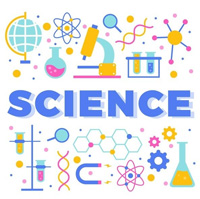 At Broughton Hall, we encourage our girls to be inquisitive throughout their time at school and beyond. Practical, hands on Science is at the heart of our subject and with our team of experienced technicians we ensure students get many opportunities to see Science in action in the lab environment.
At Broughton Hall, we encourage our girls to be inquisitive throughout their time at school and beyond. Practical, hands on Science is at the heart of our subject and with our team of experienced technicians we ensure students get many opportunities to see Science in action in the lab environment.
